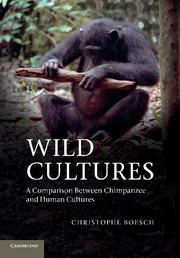Book contents
- Frontmatter
- Contents
- Acknowledgments
- Introduction
- 1 Studying culture in the wild
- 2 From human culture to wild culture
- 3 Shaping nature into home
- 4 One for all and all for one
- 5 I want to have sex with you
- 6 Learning culture
- 7 Dead or alive? Towards a notion of death and empathy
- 8 Wild culture – wild intelligence
- 9 Uniquely chimpanzee – uniquely human
- Epilogue: Will we have the time to study chimpanzee culture?
- References
- Index
Epilogue: Will we have the time to study chimpanzee culture?
Published online by Cambridge University Press: 05 October 2012
- Frontmatter
- Contents
- Acknowledgments
- Introduction
- 1 Studying culture in the wild
- 2 From human culture to wild culture
- 3 Shaping nature into home
- 4 One for all and all for one
- 5 I want to have sex with you
- 6 Learning culture
- 7 Dead or alive? Towards a notion of death and empathy
- 8 Wild culture – wild intelligence
- 9 Uniquely chimpanzee – uniquely human
- Epilogue: Will we have the time to study chimpanzee culture?
- References
- Index
Summary
Margot gave us the most lovely and charming surprise when she reappeared in the group at the end of November 2000 carrying her two newborn babies. Twins! This is extremely rare in chimpanzees and this was the first time we had ever seen a mother with twins at Taï. The sight of the two tiny faces peering out at the world from the safety of their mother’s arms was very, very delightful (Figure 10.1). From the few examples I had heard of chimpanzees giving birth to twins, I knew it could be very challenging for a mother to invest in two constantly hungry, demanding babies and to prevent them from falling when she is feeding high up in the trees. However, Margot seemed at ease with the two of them sucking eagerly on her breasts and while she was resting on the ground, she played “airplane” tenderly with them by placing one infant at a time on her foot while reassuring them with one hand. Mustapha, her older son, was very curious about the babies and Margot let him touch them when he was quiet but refused to let him play with them as they were still so small. The babies, who we named Miriam and Makeba, were very active and curious about the world around them and they grew as two very playful infants.
To my horror, as the twins were about to turn 2 years old, I learned that a poacher had come into the forest and killed Margot and young Miriam. He carried the three of them – two dead, one alive – back to the village, where he ate the two dead chimpanzees and sold Makeba as a pet. According to our sources, she was most likely sold to someone in Abidjan, the capital, but we were unable to track her down and it is unknown whether she is still alive today. Shockingly, we also learned that the same poacher shot two other adult females, who then vanished into the thick forest, where they most likely died in awful agony. What happened to Margot, Miriam, and Makeba is just one example of what is happening every day throughout the pristine forests remaining in Africa as new roads are opened and new blocks of forest are made accessible to hunters.
- Type
- Chapter
- Information
- Wild CulturesA Comparison between Chimpanzee and Human Cultures, pp. 239 - 242Publisher: Cambridge University PressPrint publication year: 2012



